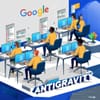Google has introduced Antigravity, a new coding environment that centers on productivity rather than flashy AI features. Instead of simply assisting with autocomplete or code suggestions, Antigravity is designed to empower multiple autonomous agents that can interact directly with the editor, terminal, and browser — making it feel more like a team of assistant-developers than a traditional AI tool.
A key innovation is the use of “Artifacts” — tangible outputs like task lists, execution plans, screenshots, and browser recordings — which give developers clear, verifiable insights into exactly what the AI agents are doing. This approach builds trust because it's not just about “what” the AI produced, but how it arrived there.
Antigravity offers two main user interfaces: an Editor View, which resembles a familiar IDE with a sidebar agent, and a Manager View, which lets developers orchestrate and supervise several agents across different workspaces. This flexibility helps bridge the gap between traditional coding workflows and more agentic, autonomous development.
Importantly, Google built Antigravity with core principles like trust, autonomy, feedback, and self-improvement. The agents are designed to learn from past work, improving their performance over time. Instead of just doing what they're told, they grow more capable — and developers remain in the loop with tools to verify and steer their work.


